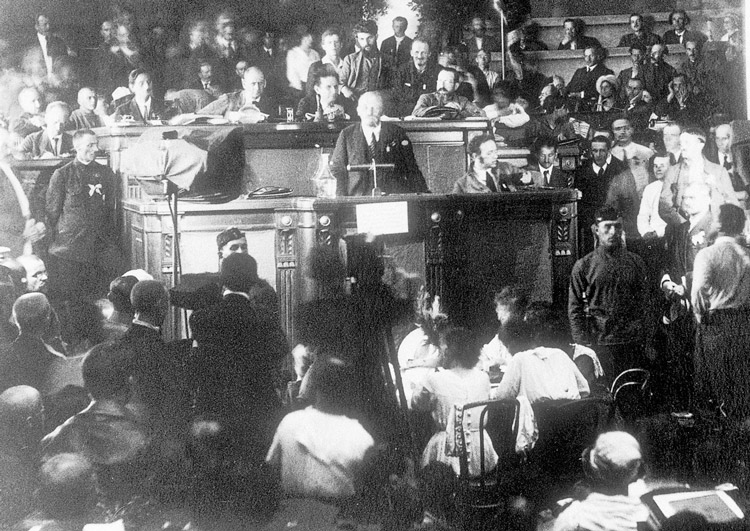One of the October Books of the Month is the Spanish edition of Lenin’s Final Fight: Speeches and Writings 1922-23. It describes the last political battle by V.I. Lenin, the central leader of the Bolshevik-led 1917 socialist revolution in Russia. He defended its proletarian internationalist course, including the right to self-determination of oppressed peoples from the czarist prison house of nations. After Lenin’s death, a counterrevolution led by Joseph Stalin took hold, reasserting Moscow’s control and overturning Lenin’s communist course. The introduction, excerpted here, is by Jack Barnes, Socialist Workers Party national secretary, and Steve Clark, managing editor of Pathfinder Press. The SWP’s support for the battle to defend Ukrainian independence from Moscow’s invasion is in continuity with Lenin’s stance. Copyright © 2010 by Pathfinder Press. Reprinted by permission.
Between late September 1922 and early March 1923, the final months of his active life, Vladimir Lenin led a political battle within the leadership of the Communist Party of the Soviet Union. At stake was nothing less than whether the party would continue advancing along the political course that had brought the Bolshevik-led workers and peasants of the former tsarist empire to power some five years earlier. That victory had opened the door to the first socialist revolution and ushered in a new historical era with prospects for proletarian-led popular revolution not only in Europe but across Asia and beyond. …
It was a political fight over the class trajectory of the Soviet republic and Communist Party. …
The Bolshevik-led government sought from the outset to establish a union of proletarian Russia and the oppressed peoples long encased within the old tsarist prison house of nations across Europe and Asia. But that goal could only be achieved by the voluntary action of those peoples, whose unconditional right to national self-determination was recognized by the new government.
The Soviet congress in January 1918 established the Russian Soviet Federated Socialist Republic (RSFSR) “leaving it to the workers and peasants of each nation to decide independently at their own authoritative congress of soviets whether they wish to participate in the federal government … and on what terms.”
By late 1922, twenty-one autonomous republics and regions had been established within the RSFSR itself, and the revolutionary government was collaborating with soviet republics in Armenia, Azerbaijan, Belorussia, Georgia, and Ukraine to form what in December 1922 would become the Union of Soviet Socialist Republics (USSR). Lenin, however, objected to Stalin’s initial draft of a Central Committee resolution, which negated the Bolsheviks’ long-standing proletarian internationalism by calling for “entry” of these other republics into the Russian federation.
“We consider ourselves, the Ukrainian SSR, and others equal,” Lenin wrote in a September 1922 letter to the party’s Political Bureau, and “enter with them on an equal basis into a new union, a new federation, the Union of the Soviet Republics of Europe and Asia.”
In a note to the Political Bureau the following day, Stalin acquiesced to an amended form of this proposal and several other of “Comrade Lenin’s unimportant amendments,” as he called them. Stalin’s note dismissively referred to Lenin’s uncompromising opposition to Great Russian chauvinism as the “national liberalism of Comrade Lenin.”
Two months later Lenin was outraged to discover that Central Committee member Grigory Ordzhonikidze, in the presence of another CC member, Aleksey Rykov, had physically struck a Communist from Georgia during a dispute over national rights. In Lenin’s late December letter to the upcoming party congress, he wrote that the Bolsheviks’ support for the right of national self-determination “will be a mere scrap of paper” if the party is “unable to defend the non-Russians from the onslaught of that really Russian man, the Great Russian chauvinist, in substance a scoundrel and a tyrant, such as the typical Russian bureaucrat is.”
And Lenin concluded: “That is why internationalism on the part of oppressors or ‘great’ nations, as they are called (though they are great only in their violence, only great as bullies), must consist not only in the observance of the formal equality of nations but even in an inequality, through which the oppressor nation, the great nation, would compensate for the inequality which obtains in real life. Anybody who does not understand this has not grasped the real proletarian attitude to the national question; he is still essentially petty bourgeois in his point of view and is, therefore, sure to descend to the bourgeois point of view.” …
None of these political challenges could be addressed, Lenin insisted, without substantially increasing the weight of politically tested workers and peasants in leading bodies of the party and state.
During the civil war, Lenin pointed out, “We concentrated our best party forces in the Red Army, we mobilized the best of our workers, we looked for new forces at the deepest roots of our dictatorship.” Vast numbers of those selfless cadres had been killed in combat or felled by disease. Now it was time to renew this effort under the current conditions facing the Soviet republic.
On combating great-power chauvinism
Memo To The Political Bureau [of All-Russian Communist Party, formerly the Bolshevik Party]
October 6, 1922
I declare war to the death on Great Russian chauvinism. I shall eat it with all my healthy teeth as soon as I get rid of this accursed bad tooth. It must be absolutely insisted that the union Central Executive Committee should be presided over in turn by a Russian,
Ukrainian,
Georgian, etc.
Absolutely!
Yours,
Lenin


